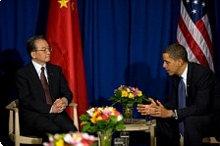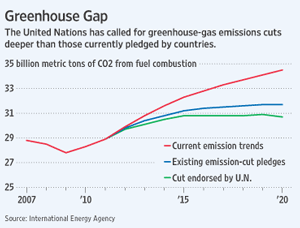History will look back at the Copenhagen Summit as the moment at the beginning of the 21st century when the power structure of the world fundamentally changed.

Towards a De-Facto G-2: The Chinese Emergence and the European Re-Alignment
During the run-up to the summit, President Obama and most European leaders believed they were in their customary role of guiding the rest of the world. Without fanfare, Chinese Premier Wen Jiabao quietly formed a Chinese-led core group of emerging market economic powerhouses: India, Brazil, and South Africa – a group eventually given the acronym “BASIC.” Most governments, including that of the US, could not accept the EU’s proposal which relied heavily on regulatory mechanisms and targets. By the closing day of the conference, the arduously crafted European regime, which focused on regulating and taxing carbon emissions, had been ignored or dismissed by the other attendees, including by President Obama himself.
Arriving near the end of the conference, President Obama found himself in need of some “souvenir” to show for his transatlantic trip. His advisers warned him that even a hint of support for the EU’s proposed carbon controls would be unacceptable to Congress. The Chinese Premier offered him an opportunity to align the US with the Chinese-drafted BASIC declaration. Given the choice of returning to the US with nothing, or joining in a new statement of “good intentions,” Obama accepted co-sponsorship of the Chinese draft.
European leaders were shocked that their heavy political investment in a “European” post-Kyoto regime had been sidelined. Worse, they were angered that President Obama not only ignored their initiatives but also declined direct negotiations with them. Instead, he chose to give primary personal attention to Premier Wen Jiabao and ultimately joined with China in what was effectively seen by Europeans as an initiative of the new “G-2.”
During the Presidency of George W. Bush there had been growing complaints from Europeans that the US had forsaken multilateralism in favor of unilateral assertion of American hegemony. Bush was perceived as a bully, uninterested in consultations with cautious Europeans and uncommitted to the long process of transatlantic coordination of economic and security initiatives which was born during WWII.
Since that time, the primary model for multilateral negotiation had been close diplomatic interaction between the US and Europe in pursuit of consensus, followed by joint efforts to draw the rest of the world into a process of collegial decision making. Transatlantic cooperation was the foundation of the Bretton Woods framework of institutions and rules for managing liberalization of trade and financial flows. This framework successfully brought about globalization of the world economy, enabling a vast array of nations to rise up from bleak origins and to participate in rapid development of economic, technological, social, and even political advances.
Copenhagen revealed to us that the success of globalization has also realigned the power structure, which underlies international cooperation, rivalries, and conflict. At Copenhagen, the US-EU basis for establishing international consensus failed, and was replaced by newly improvised collaborative efforts of a handful of countries led by China, and joined by the US.
The Strategic Meaning of Copenhagen
Copenhagen was about the economic dynamics of the next several decades: what costs would be borne, and by whom. From that perspective, the Europeans were perceived as the relatively prosperous and well-intentioned intellectuals who believed they held the right answers for the rest of humankind. Politicians from other capitals, primarily concerned with domestic economic and social consequences of potential de-carbonization, emission cuts, and technology transfers, did not assign credence to what was perceived as a self-serving European agenda.
But even beyond this reluctance, most governments were not ready to accept the huge costs and limitations of economic growth that would be imposed on their industries and peoples. A degree of international political cooperation was called for on a scale that has been proven again and again to be unachievable. The majority of governments, and especially their politicians and legislatures, still cannot find significant domestic support to yield sovereignty over jobs and resources to “foreign” authorities.
China’s leaders had recognized early on that they would be blamed if Copenhagen failed unless they offered something positive. In the past, China might have remained in the background while another nation or group of nations stepped forward to block international consensus. For example, when the Doha Round of international trade negotiations broke down in 2008, it was the Indian representative who effectively stood in the way of further progress, while a reluctant China was hidden in the background.
It should be remembered that the Kyoto Accord taught President Clinton and the rest of the world that no US President has the power to negotiate and approve an agreement that would effectively change US laws and circumscribe the authority of Congress. When Vice President Gore flew to Kyoto to consummate an environmental agreement the initial news throughout the world was that an historic breakthrough in global cooperation had been achieved. Instead, Congress reacted by advising President Clinton that he should not seek Senate approval of the Kyoto Accord.
At the time of Congressional inaction on the Kyoto Accord, much blame was assigned to the reluctance of countries like China and India to participate. Congressional politicians argued that the US could not limit its own economy when other major world polluters were free to continue without restraint.
Frankly, this was a convenient excuse for Congress’s reluctance to act, but it was not the only reason for inaction. Political rejection was not simply a matter of Republican reluctance. The accord was rejected by the “Blue” Democratic states of the US industrial heartland and Democrats representing states that mined coal and produced and processed oil and gas. An open vote would have been a huge political embarrassment to President Clinton and Vice President Gore. In subsequent years, President George W. Bush received the same advice from Senate leaders, so he simply avoided addressing the Kyoto Accord as his predecessor had done: by ignoring it.
Now that China and India appear to be party to some political commitment to limit environmental contamination, White House aides valiantly argue that President Obama can use this apparent breakthrough to help garner support for the Waxman-Markey “cap and trade” carbon bill before Congress.
It is doubtful that the Chinese and Indian recognition of their responsibilities will dramatically change the outlook for the President’s domestic carbon initiative. He would still face objections from Republicans and members of his own party who represent industrial, mining, and oil and gas sectors. In the midst of rising unemployment, anticipated tax increases, and the underlying costs of the President’s health care reforms, Congress will likely prove reluctant in 2010 to impose dramatic new costs on the American economy. Considering present polls indicate substantial losses of Democratic Congressional seats in the mid-term election, Democrats determined to keep their own seats are unlikely to defy popular opinion against increased restrictions on and costs of energy use.
The dynamics of the Copenhagen conference raise fundamental questions about the power structure of the world of the 21st century. Even before Copenhagen it was becoming evident that the transatlantic power structure of preceding decades had less influence. Instead, an array of newly emerging powers was asserting themselves.
In the struggle for broader acceptance of their initiatives, both the Europeans and the US increasingly found themselves engaged in a competition for influence with other nations around the world. The functioning and voting structure of the IMF came into question. New regional arrangements for economic and political cooperation began to proliferate. These took the form of free trade arrangements (FTAs) and less legally binding but enhanced forms of cooperation. The structure of the UN Security Council and other UN bodies came into question.
The Way Ahead
The Doha Round (which had been under way for almost a decade under the framework of the WTO) has now come to the point that a US-EU accord, even if it could be reached, would have only minor influence. The primary trade interests of both the EU and the US are now focused on emerging markets, and particularly on China, India, and the Asian Tigers. The objectives of these emerging markets must be reconciled with those of the advanced industrial world in order for a new international agreement to be achieved. Unfortunately, there is little possibility of a breakthrough on that basis any time soon.
The decision of world leaders to enlarge the G-8 to a new G-20 framework gives the appearance of comprehensiveness. However, the underlying reality is that this group is far too large to facilitate formulation of new initiatives. Instead, ad hoc collaboration of individual governments will take place within the G-20. These ad hoc arrangements will vary according to the issues being addressed and the relative power of participants to affect the outcome. International financial reform will be of primary interest to some but not all of the members; food supplies will take primacy for some but not others; relative emphasis will vary on economic growth versus the distribution of the gains from growth; environmental issues will continue to “be of interest” but without enthusiastic pursuit of solutions by all members; geopolitical disruptions will from time to time interrupt and divert attention.
Separately, the Financial Stability Board (FSB) established by the G-20 will grind out an array of important proposed reforms of the functioning of international financial markets, giving the appearance of multilateral cooperation. Behind the curtain, politicians in national governments will intervene to impede or delay implementation of reforms that might inflict damage on domestic interests. Already, the EU and Eurozone governments, led by Germany, have been applying the brakes to reforms that would have painful consequences for European banks and insurers. The US and the Europeans can sometimes find common ground, but for the most part they are on different trajectories reflecting the national interests of the participants and the relative pace of adjustments to the Great Recession of the last few years.
At the heart of Copenhagen was President Obama’s apparent acceptance of the importance of the emerging “G-2” relationship between the US and China. From China’s point of view, the G-2 is collaboration between the receding, but still relevant, dominance of the US in world affairs and the emerging power of China on the world stage. Given President Obama’s evident emphasis on the primacy of China in his recent trip to Asia, it seems natural that these two rivals would find an array of common interests.
Recognizing that the G-2 is a new reality, it may be asked whether China is really ready for such a potent role in world affairs. The Chinese economy has suffered grievously from the deepest downturn in world trade since the 1930s. The Chinese leadership has levitated its economy with a combination of fiscal and lending stimulants that exceed half of China’s GDP. This artificially levitated economy is unstable and will require continuous and obsessive attention to avert collapsing bubbles, growing unemployment, industrial stockpiling, and growing overcapacity of industries for which there is inadequate world demand. China’s present leaders, and those to take over in 2012, will have their hands full just keeping the Chinese economy functioning without disruption. There can be doubt whether this China is now ready to take on a role of global leadership.
In the meantime, the world’s geopolitical power structure will remain in flux, with the power structures of the past decreasing in importance for the future. This change poses big questions for how the US can project global or regional power and influence in coming decades. US power projection will not only be constrained by government budgets and limitations on American borrowing from world capital markets, but also by constraints posed by continuously shifting allegiances of other nations and groups of nations.
———-
***Posted January 17th, 2010




